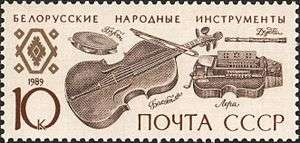Music of Belarus

Belarus is an Eastern European country with a rich tradition of folk and religious music. The country's folk music traditions can be traced back to the times of the Grand Duchy of Lithuania. In the 20th century, the Soviet control of the country somewhat limited musical development because nationally oriented music was considered subversive and dangerous to the Soviet authority. The country's musical traditions spread with its people to countries like Russia, Canada, United States, Kazakhstan, Latvia and Ukraine . The people of Belarus were exposed mostly to Russian pop music during this period and also after independence in 1991. In 2002, however, Alexander Lukashenko has signed a decree requiring 50% of all FM broadcast music to be Belarusian in origin, and since January 1, 2005 the rule was made even stricter (75% of daily broadcast music must be Belarusian). Though it doesn't regulate songs language, so most of broadcast music is still in Russian.
| Part of a series on |
| Belarusians |
|---|
| Culture |
|
| By regions |
|
| Closely related peoples |
| Religion |
| Languages and dialects |
| Topics |
|
Traditional music
Documentation of its music stretches back to at least the 15th century. Prior to that, skomorokhs were the major profession for musicians. A neumatic chant, called znamenny, from the word 'znamia', meaning sign or neume, used until the 16th century in Orthodox church music, followed by two hundreds of stylistic innovation that drew on the Renaissance and Protestant Reformation. In the 17th century, Partesnoe penie, part singing, became common for choruses, followed by private theaters established in cities like Minsk and Vitebsk.
Music of Soviet Belarus
In the 20th century, the first secondary education institute in Belarus was founded (1924) and the first operas (Mikhas Podgorny by E. Tikotsky, In Virgin Forests of Polesie by A. Bogatryev and The Flower of Happiness by A. Turenkov) and ballets (The Nightingale by M Kroshner).
Popular Soviet Belarusian music was composed by several prominent bands, many of whom performed Belarusian folk music. Folk rock act Pesniary, formed in 1969 by guitarist Vladimir Mulyavin, became the most popular folk band of the Soviet Union, and often toured over Europe. Pesniary's example inspired Siabry and Verasy to follow their way. The tradition of Belarus as a centre of folk and folk rock music is continued today. Late 1970s saw more straightforward rock bands such as Suzorie
Modern Belarus
Belarus gained independence after the fall of the Soviet Union and new bands appeared, including N.R.M. (probably the best-known rock band of the late 1990s, and 2000s (decade)), ULIS. Modern pop stars are also well-known, including Boris Moiseev and Lyapis Trubetskoy (though they tend to orient themselves toward Russia and Russian speakers). There are also electronic music performers like Autism, Energun 22, h.h.t.p., Dromos. Worth noting is Drum XTC performs live drum and bass. Around 2002 a new generation of electronic bands appeared, organized by Electrokids promo-group, including the groups like Randomajestiq, Stone People, Dreamlin, T-Trider, CherryVata and Koordinate of Wonders.
Rock music of Belarus arose in Perestroika times. Bands like Bi-2 (currently living in Russia), Lyapis Trubetskoy, Krama and ULIS were founded in the late 1980s or early 1990s. Though rock music has risen in popularity in recent years, the Belarusian government has attempted to limit the amount of popular music aired on the radio, in favour of traditional music of Belarus. These restrictions have encouraged some Belarusian bands to sign up to Russian labels and to tour more in neighbouring countries.
The tradition of Belarus as a centre of folk and folk rock music is continued today by Stary Olsa, Gods Tower, Vicious Crusade, Bristeil and Kriwi, among others. Stary Olsa is a Neo-Medieval music revivalist band that uses authentic instruments of the medieval Belarus (then part of Grand Duchy of Lithuania).
In 2003, Belarus took part in the Junior Eurovision Song Contest for the first time. Their participant, Volha Satsiuk, came in 4th place. In 2004 Belarus made it to the semifinals of the regular Eurovision Song Contest. The country was represented by a duo Aleksandra and Konstantin, who failed to reach the final. Nevertheless, they won the Junior Eurovision Song Contest 2005 the following year, with Ksenia Sitnik's song, 'My Vmeste'. Whilst the nation has never won the main contest, Belarusian-Norwegian singer-composer Alexander Rybak won for Norway in 2009, with his composition Fairytale earning a record score.
The Belarusian authorities promote folk or "Slavic" music at the country's top musical event—the state-sponsored Slavianski Bazaar in Vitebsk, an annual pop and folk music festival in Vitebsk. The biggest festival of Belarusian rock music takes place outside of Belarus, in Gródek, northeastern Poland, a small town some 40 kilometers east of Białystok—the center of Podlaskie Voivodeship, which is inhabited by a 200,000-strong Belarusian minority. The festival, held in July every year since 1990, is organized by the Belarusian Union of Students (BAS) in Poland. The official name of the event is the Music Festival of Young Belarus or Basovišča. Some rock music fans dubbed it "Belarusian Woodstock."
See also
References
External links
| Wikimedia Commons has media related to Music of Belarus. |
| |||||||||||||||||||||||||||||||||||||||||
| ||||||||||||||
